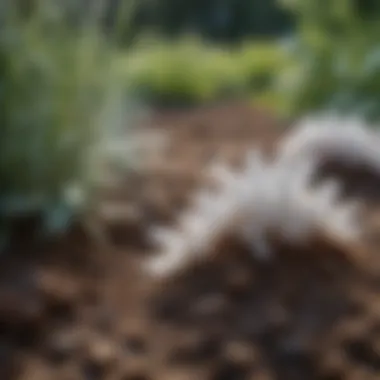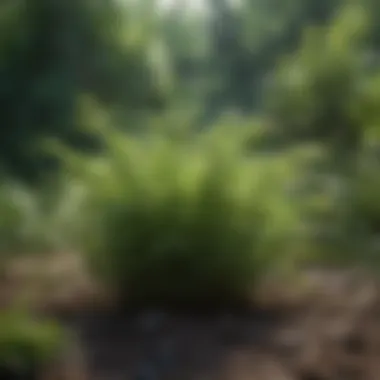Harnessing Salt Water: A Natural Approach to Weed Control


Intro
Managing weeds is a persistent challenge for gardeners. They compete with desirable plants for nutrients, water, and sunlight. Traditional herbicides often come with negative ecological impacts. A growing interest in natural solutions has highlighted salt water as a potential herbicide. Salt water's efficacy is worth exploring for those seeking an environmentally friendly approach to weed control.
Key Insights and Trends
The Role of Salt Water in Weed Management
Studies indicate that applying salt water can effectively inhibit weed growth. Salt disrupts the plant’s water balance, leading to dehydration and eventual death. This natural method aligns with increasing trends towards eco-conscious gardening. In many gardens, less harmful solutions are in demand, as homeowners seek sustainable herbicides.
Growth in Organic Gardening Techniques
The popularity of organic gardening continues to rise. More gardeners are turning to methods that minimize chemical use. Salt water fits into this trend, as it uses common kitchen salt mixed with water. This simple composition appeals to a segment of gardeners aiming for effective yet safe gardening practices.
Practical Tips and How-To Guides
How to Use Salt Water for Weeding
- Preparation: Combine one cup of table salt with one gallon of water. Stir until the salt dissolves completely.
- Application: Use a spray bottle or watering can to apply directly to the unwanted weeds. Focus on the leaves, as this is where salt works best.
- Timing: Apply salt water on a sunny day to increase effectiveness. The heat helps to intensify salt's impact on plant cells.
- Target specific weeds: Avoid spraying desired plants. Salt can harm many types of vegetation.
Best Practices for Applying Salt Water
- Use sparingly: Excessive salt can alter soil health.
- Monitor for rain: Heavy rainfall can wash away salt water.
- Consider soil type: Sandy soils may flush salt quicker than clay, influencing effectiveness.
Salt water management is effective, but caution is necessary to protect surrounding plants and soil health.
Ecological Considerations
Using salt water brings benefits but requires care. It’s essential to consider that salt can lead to soil degradation over time. Regular applications can disrupt soil microbiomes, adversely affecting soil quality. Thus, moderation is key.
Prologue to Salt Water and Weeds
Understanding the mechanisms by which salt water may serve as an effective strategy in weed management is a crucial aspect of gardening and agricultural practices. The discussion begins with an exploration of what weeds are and why they proliferate, followed by a closer look at salt water and its properties. This foundational knowledge provides the context necessary for evaluating the efficacy of salt water as a herbicide.
Weeds, often defined as unwanted plants, compete with cultivated plants for nutrients, water, and light. They can detract from aesthetic value and reduce crop yields, making their management critical for home gardeners and farmers alike. The challenge lies in finding an approach that is both efficient and gentle on the ecosystem. Salt water emerges as a potential ally when considering cost-effective alternatives to synthetic herbicides.
Understanding Weeds
Weeds can vary widely in species and characteristics, but they generally share one significant trait: they thrive in environments where cultivated plants are also present. Common types of weeds include dandelions, crabgrass, and bindweed. They are often hardy and resilient, making eradication difficult. Furthermore, they can reproduce rapidly, leading them to dominate gardens and fields if unchecked.
Home gardeners should recognize that while some weeds may offer benefits, like attracting pollinators, others can hinder the growth of desirable plants. Over time, unmanaged weeds can lead to increased maintenance costs and reduced crop quality. Thus, effective weed management is a time-sensitive and essential part of gardening.
Salt Water Defined
Salt water, or saline water, is simply water that contains a significant concentration of salts, primarily sodium chloride. In gardening, using salt water as a herbicide involves making a mixture of salt dissolved in water. The required concentration may vary depending on the type of weeds targeted. While the formulation can be easily prepared at home, the application must be handled with care, as it can impact surrounding plants and soil health.
The potential benefits of salt water lie in its accessibility and cost-effectiveness. Beyond its financial advantages, many gardeners are interested in non-chemical approaches to weed management. Salt water, as a naturally occurring substance, aligns well with organic gardening principles. However, the science behind its efficacy necessitates careful study and consideration, to fully understand its impact on weed species and the broader ecological environment.
The utilization of salt water as a weed management technique encourages eco-friendly practices, allowing gardeners to make informed choices.
The Science of Salt and Plant Interaction
How Salt Affects Plant Cells


When salt is applied to a plant, it enters the plant cells through the roots. The high concentration of salt outside the cell causes water to move out of the cell through osmosis. This process creates a state of dehydration, which disrupts cellular functions.
In particular, the following effects occur:
- Reduced turgor pressure: Plants rely on water to maintain structural integrity. Salt-induced dehydration diminishes turgor pressure, making the plant wilty and weak.
- Disrupted metabolic processes: Salt stress can hinder photosynthesis and respiration, ultimately affecting growth and health.
- Ion toxicity: High levels of sodium can interfere with nutrient absorption. This can lead to nutrient deficiencies, compounding the stress experienced by the plant.
Each of these aspects contributes to the overall deterioration of weeds when treated with salt water, causing them to wither over time.
Mechanisms of Weed Desiccation
The desiccation of weeds involves multiple physiological mechanisms that are initiated once they are exposed to saline conditions. Salt water interacts with plants in key ways:
- Osmotic stress: The initial reaction is osmotic stress, drawing water out of the plant cells. This effect is heightened in weeds, which often thrive in competitive environments.
- Cellular damage: Extended exposure leads to the formation of reactive oxygen species (ROS), which can damage cellular components such as membranes and proteins.
- Inhibition of growth: The synthesis of key growth hormones is impeded, causing stunted growth and eventual die-off of the weed.
The desiccation effect of salt is not instantaneous; it requires time to manifest as plants adjust to the stress.
By understanding these mechanisms, gardeners can be more strategic in the application of salt water for weed management, ensuring they use this method effectively without causing unnecessary harm to the surrounding environment.
Benefits of Using Salt Water on Weeds
Using salt water as a weed management strategy presents several noteworthy benefits that homeowners and gardening enthusiasts can appreciate. When utilized properly, it offers a distinctly cost-effective alternative to traditional chemical herbicides while promoting a more natural gardening approach. Delving deeper into the specific advantages can provide valuable insights for those considering salt water in their gardening practices.
Cost-Effectiveness
One of the most significant advantages of using salt water is its cost-effectiveness. Unlike commercial herbicides, salt is inexpensive and widely available. For home gardeners, this means they can implement weed control without the financial burden associated with chemical options. Simple kitchen salt can be transformed into a potent solution for managing weeds. This affordability allows gardeners to maintain their landscapes effectively on a budget.
Many garden centers sell pre-mixed salt solutions, but the DIY approach can save even more money. A homemade solution often consists of just water and salt in varying concentrations, depending on the intended use.
Accessibility
Salt is not only cost-effective but also accessible. Most households already have salt in their kitchens. This accessibility makes it an inviting option for casual gardeners who may be wary of handling complex chemical herbicides. They can easily mix salt with water in a spray bottle and apply it directly to the targeted weeds. This ease of access removes barriers for individuals looking to address weed problems immediately, without waiting for a specialty product to arrive or searching through garden shops.
Furthermore, using salt water does not require specialized equipment. Any standard spray bottle can serve to apply the solution, ensuring that the treatment process is straightforward.
Non-Chemical Approach
The non-chemical nature of salt water as a herbicide is perhaps the most compelling aspect for environmentally conscious gardeners. Unlike synthetic herbicides that can introduce harmful chemicals into the soil and surrounding ecosystem, salt water is a natural alternative that minimizes environmental impact.
Many gardeners are concerned about the safety of chemical herbicides, especially if they have pets or children playing in the yard. Salt water provides an alternative that is generally recognized as safer in such contexts. While it's essential to apply it carefully to avoid damaging desirable plants, the peace of mind that comes from using a simple, natural solution can be liberating for many gardeners.
In summary, the benefits of using salt water to manage weeds encompass cost-effectiveness, accessibility, and an environmentally friendly approach to gardening. By leveraging salt as a natural herbicide, gardeners can take proactive steps toward maintaining their green spaces without financial strain or adverse environmental effects.
Limitations of Salt Water as a Herbicide
Using salt water as a herbicide is not without its drawbacks. While its efficacy in managing weeds is documented, it is crucial to assess its limitations. Understanding these limitations helps in making informed decisions about weed management strategies, especially for homeowners and gardening enthusiasts. The considerations include the impact on soil health, potential harm to desired plants, and environmental concerns.
Impact on Soil Health
Salt water, despite its herbicidal properties, can adversely affect soil health. The introduction of high salt concentrations into the soil can disrupt its microbial ecosystem. Beneficial microorganisms play crucial roles in nutrient cycling and plant health. Excessive salt can lead to a decrease in microbial populations, which may result in nutrient imbalances. Moreover, salt can alter soil texture and structure, making it less conducive for plant growth.
Salt accumulation can also lead to soil salinity, which reduces soil permeability. This condition limits water infiltration and retention in the soil. Over time, plants may struggle to thrive. Therefore, while salt water might offer a quick fix for weed problems, its long-term implications on soil health are significant.
Potential Harm to Desired Plants


Another limitation to consider is the potential harm to desirable plants. Salt does not discriminate between weeds and the plants you intend to cultivate. If applied indiscriminately, salt water can damage or even kill desired plants.
For example, plants with lower tolerance to salt may suffer from leaf burn or wilting. This risk is particularly high in mixed planting areas, where the likelihood of overspray or runoff increases. Gardeners must exercise extreme caution when using salt water, especially near ornamental or food plants.
Environmental Concerns
The use of salt water as a herbicide raises various environmental concerns as well. Excess salt can leach into groundwater or nearby water bodies, leading to increased salinity levels. This can negatively impact aquatic ecosystems, affecting both flora and fauna.
Additionally, increased salinity can disrupt plant life in surrounding areas. Salt-tolerant plants may invade the area, leading to changes in local biodiversity. As salt water persists, it may create long-lasting ecological imbalances that are difficult to rectify. Considering these environmental ramifications is vital for responsible gardening practices.
"Using salt water as a herbicide demands caution and awareness of its limitations."
In summary, while salt water can be an effective tool in weed management, its limitations cannot be overlooked. Evaluating the impact on soil health, potential harm to desirable plants, and broader environmental effects is essential for homeowners and gardening aficionados. With this knowledge, they can make balanced decisions regarding weed control strategies.
Best Practices for Using Salt Water
Concentration Guidelines
The concentration of salt in water is fundamental to its effectiveness against weeds. Typically, a solution with 10% to 20% salt concentration can yield good results. However, exceeding this threshold can harm the soil and affect nearby plants. Here are a few points to consider regarding concentration:
- Start Low: Begin with a lower concentration. A 5% solution can often manage small weeds effectively without immediate risk to soil health.
- Adjust as Necessary: Incrementally increase concentration if needed. Monitor plant response and adjust your solution accordingly.
- Test First: Always test a small area before wide application. This helps in assessing both efficacy and potential damage to surrounding flora.
Application Techniques
Applying salt water effectively requires careful technique to ensure that the solution harms only the targeted weeds. Here are several application methods that contribute to effective weed management:
- Direct Application: Use a spray bottle for targeted application on weeds, ensuring the moisture reaches the leaves. This method reduces the risk of overspray on desirable plants.
- Wick Method: Dip a cloth or sponge into the salt solution and wipe it directly onto the weed leaves. This method limits contact with the soil and reduces collateral damage.
- Avoid Spraying on Windy Days: Wind can disperse the solution beyond the target area, affecting other plants. Ideally, apply salt water when wind conditions are calm.
Timing for Maximum Effectiveness
Timing plays a crucial role in the success of salt water application for weed control. To increase effectiveness, consider these factors:
- Weed Growth Stage: Young, actively growing weeds are more susceptible to salt water. Apply solutions when weeds are in their early growth stages rather than when they are mature and established.
- Environmental Conditions: Warm, dry days are favorable for application. The salt will evaporate quickly, increasing concentration on the leaves and enhancing desiccation effects.
- Post-Rain Monitoring: Avoid application immediately after rainfall. Wait until the soil is dry to ensure the effectiveness of the salt solution without dilution.
"The optimal timing and careful application of salt water can significantly lead to improved success in weed management."
By following these best practices, homeowners and gardening aficionados can safely and effectively use salt water for weed management, minimizing environmental impact while achieving desired results.
Alternatives to Salt Water for Weed Control
Finding effective weed control methods is essential for gardens and landscapes. While salt water offers a natural herbicide option, it is not always the most suitable for every situation. The use of alternatives can expand the toolbox available to homeowners and gardening enthusiasts. Each alternative presents specific benefits and considerations that can enhance weed management while minimizing ecological impacts.
Organic Herbicides
Organic herbicides are derived from natural sources, and they provide a safer alternative for weed control. Common organic options include vinegar, clove oil, and citric acid. These substances can be effective against many weeds when applied correctly.
- Vinegar is acetic acid, and it can desiccate plants upon direct contact. Its efficacy is higher in higher concentrations, typically around 20%.
- Clove oil, on the other hand, works by penetrating plant membranes and causing damage. This method is particularly useful for young weeds.
- Citric acid, found in citrus fruits, acts similarly to vinegar by creating an acidic environment detrimental to weed growth.
Using organic herbicides allows gardeners to maintain ecological balance while effectively managing weed populations. However, it is essential to apply these products carefully, as they can also harm desirable plants.
Manual Removal Techniques
Manual removal has been used for centuries and remains a reliable method for controlling weeds. This approach is straightforward and does not involve chemicals, making it accessible for many homeowners.


- Hand-pulling is one of the most common manual removal techniques. It's effective for small patches of weeds or single plants. It is crucial to remove the entire root to prevent regrowth.
- Weeding tools, such as hoes or weeders, can help efficiently remove weeds from larger areas.
- Regular monitoring of garden beds for new weed growth ensures that weeds do not take hold.
While more labor-intensive, manual removal is an environmentally friendly option with no risk of chemical residues.
Mulching as a Preventative Measure
Mulching is another excellent alternative for weed control. A layer of mulch around plants effectively suppresses weed growth by blocking light and competing for resources.
- Types of mulch include organic materials like straw, wood chips, and grass clippings, which also improve soil health as they decompose.
- Plastic or landscape fabric can be used for a more permanent solution, though they are less eco-friendly and require more careful management.
In addition to suppressing weeds, mulching helps retain soil moisture, provides insulation during temperature fluctuations, and can enrich soil as organic mulches break down.
"Using alternative weed control methods such as organic herbicides, manual techniques, and mulching can significantly improve the sustainability of gardening practices while effectively managing unwanted plants."
Case Studies and Real-Life Applications
The exploration of salt water for weed control is enriched through real-world examples. Case studies serve as practical evidence of its efficacy and provide insights into diverse applications across various settings. Such studies showcase not only successful outcomes but also the complexities involved with using salt water as a natural herbicide. They help gardeners and farmers make informed decisions based on previous experiences instead of relying solely on theoretical knowledge. This section aims to delineate notable instances where salt water has been effectively applied, providing a broader understanding of its practical implications.
Successful Use in Urban Gardens
Urban gardening presents unique challenges, particularly with weed encroachment. In several cities, community gardens have experimented with salt water application to diminish weed populations. One documented instance occurred in a community garden in San Francisco, where salt water was used as an alternative to chemical herbicides. The gardeners noticed a significant reduction in dandelions and other invasive species without harming their desired plants. They meticulously monitored the salt concentration to avoid any adverse effects on the soil, a consideration that is critical in urban environments.
Benefits of using salt water in these urban gardens include:
- Cost-effectiveness: Many urban gardeners operate on tight budgets, so using readily available salt and water offers a feasible solution.
- Reduced Chemical Dependency: With growing concerns regarding chemical runoff, using natural substances aligns with sustainable gardening practices.
- Community Engagement: Experiments with salt water as a herbicide foster conversations among community members about alternative gardening methods.
It's important to note, however, that the application frequency and concentration of salt must be carefully managed. Inappropriate usage can lead to soil degradation, affecting long-term garden health.
Observations in Agricultural Settings
In agricultural settings, the use of salt water has exhibited both innovative applications and cautionary tales. A study conducted on a small-scale farm in the Midwest illustrated the dual-edged nature of using salt water. The farmer aimed to control a persistent plague of crabgrass in his fields. Initial applications resulted in visible weed suppression. However, as the season progressed, he observed signs of soil salinity build-up, which threatened the viability of crops like tomatoes and spinach.
Key observations from this case include:
- Short-term Effectiveness: Salt water may provide quick results in weed control, but the long-term effects on crop health can be detrimental.
- Soil Monitoring: Frequent soil tests are necessary when using salt water to ensure that salinity levels remain manageable.
- Crop Selection: Farmers may need to consider the sensitivity of their crops to salinity levels, which can be problematic for certain plant types.
Overall, experiences from urban gardens and agricultural setups reveal critical insights into the application of salt water for weed management. They emphasize the need for careful consideration regarding concentrations and ongoing soil health assessments to maximize effectiveness while minimizing environmental impact.
By analyzing these case studies, we can gather valuable knowledge that can benefit both urban gardeners and agricultural practitioners in their ongoing campaigns against unwanted plant growth.
Epilogue
Summary of Findings
Salt water as a weed management technique brings several noteworthy points to light:
- Effectiveness: The findings highlight that salt water can effectively kill certain types of weeds, disrupting their cellular function and leading to desiccation.
- Cost-Effectiveness: Utilizing readily available salt can be a low-cost alternative compared to commercial herbicides.
- Accessibility: Many homeowners have easy access to salt, making it an attractive option for personal gardens.
- Non-Chemical Approach: This method aligns well with organic gardening practices, allowing for a more natural approach to weed control.
However, it is essential to also consider the negative aspects:
- Soil Health: High salt concentration can harm soil structure and microflora.
- Impact on Desired Plants: Salt does not discriminate; it can also affect desirable plants if not applied carefully.
- Environmental Concerns: Runoff from treated areas may harm nearby ecosystems.
The summary serves as an eye-opener for gardeners considering integrating salt water into their weed management strategies, presenting a balanced view of its implications.
Final Recommendations for Gardeners
For gardeners looking to implement salt water as a weed control method, thoughtful application is paramount. Here are key recommendations:
- Start with Dilution: Begin with a lower concentration to observe results and minimize damage to surrounding vegetation.
- Target Specific Areas: Apply salt water directly to weeds rather than spraying indiscriminately. Use a spray bottle for accuracy.
- Timing is Key: Apply salt water during dry weather for maximum desiccation effects and avoid rainy days that could dilute the product.
- Monitor Soil Conditions: Regularly assess soil health after using salt water. Make sure to amend with fresh organic matter if needed.
- Evaluate Alternative Methods: Combine salt water with other weed control strategies for best results.
By following these recommendations, home gardeners can effectively harness the benefits of salt water while mitigating its downsides. This balanced approach is essential for sustainable gardening practices.



